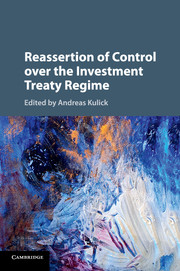Book contents
- Frontmatter
- Contents
- List of Contributors
- Preface
- PART I Introduction, Theory and Domestic Law Approaches
- 1 Reassertion of Control: An Introduction
- 2 Masters and Guardians of International Investment Law: How to Play the Game of Reassertion
- 3 Reassertion of Control and Contracting Parties' Domestic Law Responses to Investment Treaty Arbitration: Between Reform, Reticence and Resistance
- PART II Procedural Aspects and Avenues of Reassertion
- PART III Substantive Aspects and Avenues of Reassertion
- PART IV Reassertion of Control: Policy and Trends
- Index
1 - Reassertion of Control: An Introduction
from PART I - Introduction, Theory and Domestic Law Approaches
Published online by Cambridge University Press: 12 January 2017
- Frontmatter
- Contents
- List of Contributors
- Preface
- PART I Introduction, Theory and Domestic Law Approaches
- 1 Reassertion of Control: An Introduction
- 2 Masters and Guardians of International Investment Law: How to Play the Game of Reassertion
- 3 Reassertion of Control and Contracting Parties' Domestic Law Responses to Investment Treaty Arbitration: Between Reform, Reticence and Resistance
- PART II Procedural Aspects and Avenues of Reassertion
- PART III Substantive Aspects and Avenues of Reassertion
- PART IV Reassertion of Control: Policy and Trends
- Index
Summary
A. The Current State of International Investment Law: Rough Waters or Catharsis?
(1) The Legitimacy Crisis of International Investment Treaty Law and Arbitration and the Public Law Debate
International investment treaty arbitration is undoubtedly one of the most vibrant mechanisms of international dispute settlement to date. As of September 2016, the total number of investment treaty disputes has reached 739, with the very first award having been issued only about twenty-five years ago, in 1990. While having a relatively slow start, from the late 1990s onwards the number of awards increased, and so did the amounts claimed, providing a constant flow of investment treaty arbitration disputes and awards, with about forty to fifty being issued annually over the course of the past five years, including seventy in 2015. Further, investors started to realise that the international investment agreement (IIA) provisions did not merely sanction expropriation without compensation but allowed, through clauses such as fair and equitable treatment and indirect expropriation, targeting more subtle ways of deprivation of investors’ rights by the host State. Consequently, and arguably a success attributable to the increasing web of IIAs, nationalisations or other direct expropriations became rather rare. Instead, governmental measures of a more general nature, including legislation or other regulatory activity, came under scrutiny in investor-State disputes.
As these disputes shifted in focus, from targeting nationalisations absent (adequate) compensation to frequently addressing general regulatory measures of the host State, it became increasingly apparent that the host of them were fundamentally different from both commercial disputes between private actors and classical public international law disputes between sovereign States but rather displayed a considerable resemblance with domestic public law litigation. These disputes permit the control of the exercise of public authority, followed by a sanction (usually monetary damages or compensation), the enforcement of which is quite effective. Indeed, if the claims target, for example, a statute or even far-reaching governmental responses to a financial crisis, what makes the dispute functionally different from administrative or even constitutional judicial review?
However, while function and effect are similar to domestic public law disputes, adjudication in investor-State disputes is beyond the host State's sphere of influence: it is first and foremost an international dispute settlement mechanism. In addition, the treaty instruments on which the claims are based in the vast majority of cases focus on investor rights.
- Type
- Chapter
- Information
- Publisher: Cambridge University PressPrint publication year: 2016



